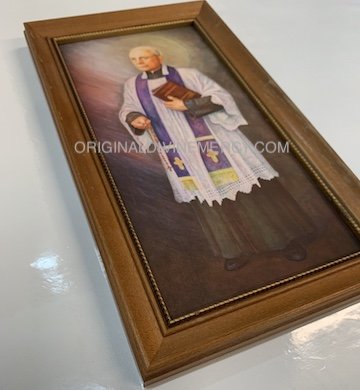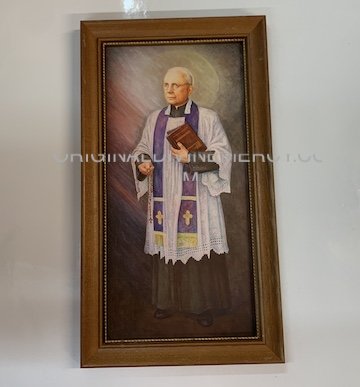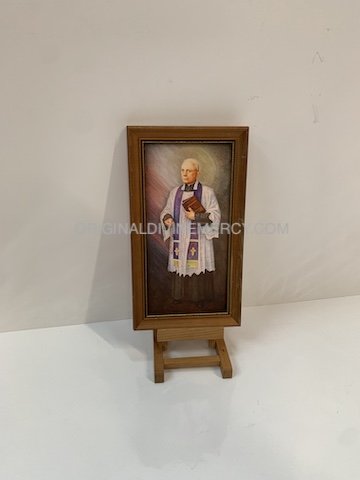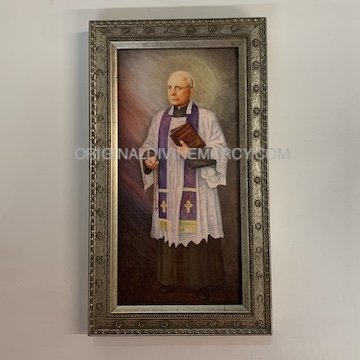6" X 12" Fr. Michael Sopocko Print in Wooden Bead Frame



6" X 12" Fr. Michael Sopocko Print in Wooden Bead Frame
6” X 12” Wooden Bead - Frame 3301
Actual Image Size: 6” X 12”
Frame Size: 7.5” X 13.5”
Blessed Fr. Michael Sopocko was the confessor and spiritual director of Saint Faustina. His role in the dissemination of the devotion of Divine Mercy cannot be overstated. Not too long after the Original Image of Divine Mercy was completed in Vilnius in 1934, St. Faustina Kowalska was diagnosed with acute tuberculosis. Obedient to the wishes of Merciful Jesus, she continued to encourage Fr. Sopocko to display the painting they had worked on together in public for veneration. Even to the end she wrote Fr. Sopocko a letter from her hospital bed insisting that he never stop “doing the work” of spreading the message of mercy through this image. She eventually succumbed to her suffering and died in 1938, and everything fell onto the shoulders of Fr. Sopocko. Anyone can see that he did not rest as the devotion has spread throughout the world, largely due to his efforts.
Fr. Sopocko himself wrote a diary in which he recorded his developing thoughts about his time with St. Faustina. In addition to being in the studio when St. Faustina described her mystical vision to the artist Euzeniusz Kazimirowski, Fr. Sopocko had the painting professionally photographed in the time of black and white photography and first published booklets and holy cards featuring the Original Image of Divine Mercy. The Sisters of Merciful Jesus, which is the order of nuns asked for by Christ Himself in His apparitions to St. Faustina was eventually founded by Fr. Spopcko in Vilnius. Fr. Sopocko also had a special ministry for those suffering from addiction, primarily alcoholism. It was Fr. Sopocko who celebrated the first ever Feast of Divine Mercy Sunday. Fr. Sopocko also led to the cause for the canonization of St. Faustina Kowalska when he visited Cardinal Karol Wojtyla (who became Pope John Paul II) in Krakow to ask for the process to begin.
Not enough has been written about this humble priest but his story is still being told. St. Faustina mentions Fr. Michael Sopocko many times in her diary.
Reverend Father Sopocko left this morning. When I was steeped in a prayer of thanksgiving for the great grace that I had received from God; namely, that of seeing Father, I became united in a special way with the Lord who said to me, he is a priest after My own Heart; his efforts are pleasing to Me. You see, My daughter, that My will must be done and that which I had promised you, I shall do. Through him I spread comfort to suffering and careworn souls. Through him it pleased Me to proclaim the worship of My mercy. And through this work of mercy more souls will come close to Me than otherwise would have, even if he had kept giving absolution day and night for the rest of his life, because by so doing, he would have labored only for as long as he lived; whereas, thanks to this work of mercy, he will be laboring till the end of the world (1256).
On 28th September 2008 in the Sanctuary of Divine Mercy in Bialystok, Poland, the beatification of Father Michael Sopocko took place. His cause for canonization is ongoing.
Also see:
Father Michał Sopocko was born on November 1st,1888 in Juszewszczyzna (known also as Nowosady) in Oszmiana district. After graduating municipal school in Oszmiana, he joined the Theological Seminary in Vilnius in 1910 and received the sacrament of his Holy Orders in 1914. His first parish was Taboryszki, where he performed his pastoral duties in the years 1914-1918. In 1918 he went to Warsaw to study moral theology at the Department of Theology of the Warsaw University. In 1923 he received his master’s degree and in 1926 his doctoral degree in theology.
In the years 1922-1924 he also studied at the Higher Pedagogical Institute while performing the duties of military chaplain. In 1924 Fr Sopoćko was appointed Head of the Military Chaplaincy for the Vilnius Region and returned to his own diocese where he remained until 1929. In 1927 he was also appointed spiritual father and confessor of the seminary In Vilnus and in 1928 he became the Head of the Department of Pastoral Theology at the Batory University. In 1932 he withdrew from his spiritual activities to devote himself to scientific work. He received his post-doctoral degree in 1934 at the Pastoral Theology Department of the Warsaw University. He received a positive opinion for the title of professor , however he did not get the nomination due to financial difficulties existing at the Theological Faculty of the Batory University. He carried on educational and scientific work up to the closure of the University and Seminary during World War II. His scientific achievements from this period revealed in numerous publications on pastoral theology, homiletics, catechetics and pedagogy. He also wrote numerous studies on popular religious and social issues.
During the German occupation, he managed to avoid arresting and for two and a half years was hiding in the vicinity of Vilnius. In 1944 after the resumption of activity of the Seminary in Vilnius he taught there until it was closed in 1945 by the Soviet authorities and was relegated to Bialystok. In the meantime he was performing pastoral ministry at the church of St. John, catechized, secretly organized catechetical courses. Threatened with arrest for this activity, he left in 1947 to Bialystok. Here he gave lectures at the Seminary in his specialties: pedagogy, catechetics, homiletics, pastoral theology, ascetic theology. He also taught Latin and Russian. An important part of his post-war activities within the Anti-Alcohol Social Committee were his educational programmes promoting sobriety in a society. Then, in the years 1951-1958 he organized a series of monthly and annual catechetical courses for nuns and lay people, and in the 50s and 60s also organized public lectures on religion at the parish church in Bialystok. In 1962, he retired, but devoted himself to pastoral work at the chapel of the Missionary Sisters of St. Family in Poleska Street, which he had expanded in 1957. At that time he also made efforts to build a church in Wiejska Street in Bialystok. Almost to the end of his days he participated actively in the life of the diocese, worked scientifically and published his work. He died in the house of the Missionary Sisters in Poleska Street on February 15, 1975.
Father Michał Sopocko devoted his all life to God and the Church. He was a man of extraordinary zeal for the glory of God which expressed in his numerous activities, rooted in a deep spiritual life. The diversity of his work was astonishing. He was a spiritual leader of a parish, a catechist, an organizer of education, a teacher, a lecturer at the University and Seminary, spiritual father, confessor of seminarians, priests and nuns, army chaplain, anti-alcohol activist, a builder of churches. However, in his life full of various activities, dominant and most beautiful path was the service to the idea of Divine Mercy., He is undoubtedly entitled to the honorable title of Apostle of Divine Mercy, beside St. Faustina Kowalska. As her confessor and spiritual director during the Vilnius period, inspired by her revelations, he devoted himself completely to spreading the truth and Divine Mercy cult. He published a number of works on Divine Mercy, sought to establish the feast, helped to paint the first picture of the Most Merciful Savior Jesus and co-founded the religious congregation of the Sisters of Merciful Jesus. Recognizing his extremely zealous service to God and the Church in the priesthood and the sanctity of his life, in 1987 Fr. Sopoćko’s beatification process was initiated on the diocesan level, which lasted until 1993. In 2002, the documentation of the process, along with an extensive biography of Fr. Sopoćko, compiled in the so-called „Positio”, was forwarded to the Congregation for the Causes of Saints in Rome. In 2004 the commission of theologians appointed by the Congregation positively assessed the Positio and then commission of cardinals affirmed the judgment of the theologians. Following this work of the Congregation on 20th December, 2004 in Vatican in the presence of the Holy Father the decree on the heroic virtues of the Servant of God was officially announced. In December 2007 at the Vatican a miracle was approved through the intercession of the Servant of God. The solemn beatification of Fr. Michał Sopocko took place on 28th September 2008 at the Shrine of Divine Mercy, where the mortal remains of the Blessed rest in peace.
Bishop Henryk Ciereszko


